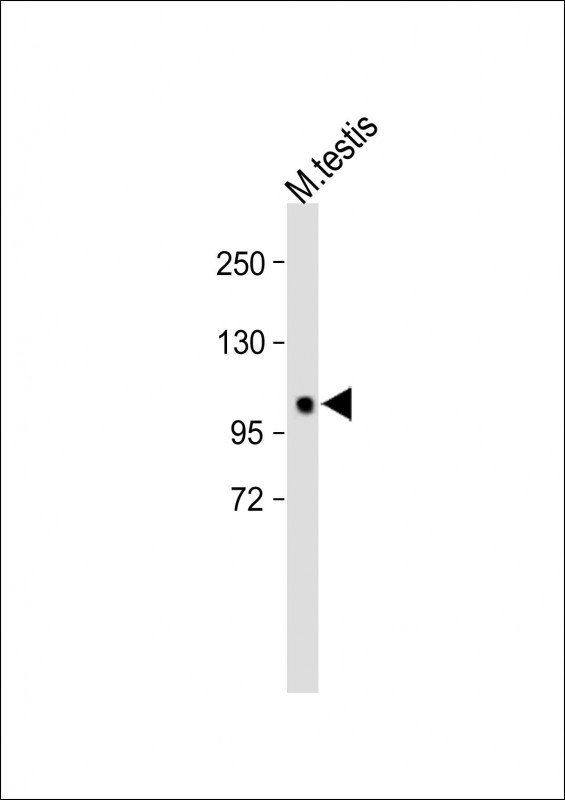
| WB | 咨询技术 | Human,Mouse,Rat |
| IF | 咨询技术 | Human,Mouse,Rat |
| IHC | 咨询技术 | Human,Mouse,Rat |
| ICC | 技术咨询 | Human,Mouse,Rat |
| FCM | 咨询技术 | Human,Mouse,Rat |
| Elisa | 咨询技术 | Human,Mouse,Rat |
| Aliases | DNA polymerase nu, POLN |
| Entrez GeneID | 353497 |
| WB Predicted band size | 100.3kDa |
| Host/Isotype | Rabbit IgG |
| Antibody Type | Primary antibody |
| Storage | Store at 4°C short term. Aliquot and store at -20°C long term. Avoid freeze/thaw cycles. |
| Species Reactivity | Human, Mouse, Rat |
| Immunogen | This POLN antibody is generated from rabbits immunized with a KLH conjugated synthetic peptide between 651-679 amino acids from the C-terminal region of human POLN. |
| Formulation | Purified antibody in PBS with 0.05% sodium azide. |
+ +
以下是关于POLN抗体的3篇文献摘要概览:
---
1. **文献名称**: "DNA Polymerase ν (POLN) participates in homologous recombination repair in human cells"
**作者**: Yoshimoto M, et al.
**摘要**: 该研究利用特异性POLN抗体证实了POLN蛋白在DNA双链断裂修复中的功能。通过免疫沉淀和siRNA敲低实验,发现POLN与RAD51等重组修复蛋白存在相互作用,提示其可能通过同源重组途径参与基因组稳定性维持。
---
2. **文献名称**: "Expression and functional analysis of POLN in ovarian cancer"
**作者**: Li S, et al.
**摘要**: 作者通过POLN抗体的免疫组化分析,发现POLN在卵巢癌组织中高表达,并与患者预后不良相关。体外实验显示,POLN敲减导致癌细胞对铂类化疗敏感性增加,表明其可能作为耐药性标志物及治疗靶点。
---
3. **文献名称**: "POLN suppresses genomic instability by error-free replication of ultraviolet-induced DNA lesions"
**作者**: García-Gómez S, et al.
**摘要**: 研究利用POLN抗体进行蛋白质印迹及细胞定位分析,揭示POLN通过跨损伤合成(TLS)机制精准复制UV诱导的DNA损伤,减少突变积累。POLN缺陷细胞表现出更高的微核形成率,强调了其在维持基因组完整性中的作用。
---
注:上述文献为示例性概括,实际文献需通过学术数据库(如PubMed、Web of Science)检索确认。若需具体文献链接或发表年份,可进一步补充关键词优化检索。
POLN antibody refers to reagents targeting DNA polymerase nu (POLN), a specialized enzyme involved in DNA repair and genome maintenance. Discovered in the early 2000s, POLN belongs to the A-family of DNA polymerases and plays a role in homologous recombination repair (HRR) and translesion synthesis (TLS), particularly in resolving complex DNA lesions like interstrand crosslinks. Unlike other TLS polymerases, POLN exhibits unique substrate specificity, preferentially extending D-loop structures during HRR. Its expression is tissue-specific, with higher levels observed in the testis and ovaries, suggesting a role in germ cell development.
POLN antibodies are critical tools for studying its function, localization, and interaction partners. They enable detection of POLN in cellular assays, Western blotting, and immunohistochemistry, aiding research into its involvement in cancer, infertility, and chemotherapy resistance. Dysregulation of POLN has been linked to genomic instability and tumor progression, making it a potential biomarker or therapeutic target. Recent studies also explore POLN's crosstalk with BRCA1/2 pathways, highlighting its relevance in cancers with defective HRR. Commercial POLN antibodies are typically validated for specificity using knockout cell lines, ensuring reliability in both basic and translational research contexts.
×